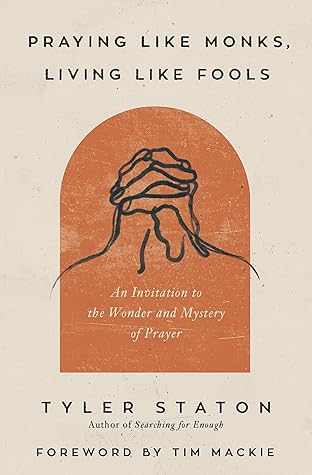More on this book
Community
Kindle Notes & Highlights
by
Tyler Staton
Read between
October 8, 2024 - June 6, 2025
This Presence is so immense, yet so humble; awe-inspiring, yet so gentle; limitless, yet so intimate, tender and personal. I know that I am known.
Everything in my life is transparent in this Presence. It knows everything about me—all my weaknesses, brokenness, sinfulness—and still loves me infinitely.
According to reliable Gallup research, more Americans will pray in a given week than will exercise, drive a car, have sex, or go to work.1
Prayer invites you to learn to listen to God before speaking, to ask like a child in your old age, to scream your questions in an angry tirade, to undress yourself in vulnerable confession, and to be loved—completely and totally loved, in spite of everything.
Prayer is not a soft place to lay our heads or a workout routine for burning spiritual fat. It’s a wild, unpredictable adventure that only those brave enough to strip themselves of artificial identities, get the wind completely knocked out of them a time or two, and see beauty in mystery will ever take. Proceed with caution. Prayer is not for the faint of heart.
“If you remain in me and my words remain in you, ask whatever you wish, and it will be done for you.”
God promises peace—a supernatural sort of peace we can’t even logically reason out—in place of crippling anxiety. The means of this exchange is prayer. But most people, regardless of spiritual maturity, stage of life, psychological awareness, or personality type, do not experience the “anxiety for peace” exchange promised through prayer. So why not?
Prayer can’t be mastered. Prayer always means submission. To pray is to willingly put ourselves in the unguarded, exposed position. There is no climb. There is no control. There is no mastery. There is only humility and hope. To pray is to risk being naive, to risk believing, to risk playing the fool. To pray is to risk trusting someone who might let you down. To pray is to get our hopes up. And we’ve learned to avoid that. So we avoid prayer.
We fear silence. But the thing that calms that fear isn’t faith; it’s trust.
Faith is the assurance of what we hope for.7 Trust is confidence in the character of God.
Jesus hasn’t revealed a God we can perfectly understand, but he has revealed a God we can perfectly trust.
When it comes to prayer, God isn’t grading essays; he’s talking to children.
C. S. Lewis said of prayer, “We must lay before Him what is in us, not what ought to be in us.”14
the wise words of Candler School of Theology professor emerita Roberta Bondi, “If you are praying, you are already ‘doing it right.’”
Most often, when this famous passage is referenced, it starts with the command to rid oneself of anxiety: “Do not be anxious about anything.” But the passage doesn’t start there. Preceding the imperative is a statement of fact: “The Lord is near.”
“Your power in prayer will flow from the certainty that the One who made you likes you, he is not scowling at you, he is on your side
Knowledge is hearsay. It’s memorizing the facts. Discovery requires personal experience.
And if you’re more comfortable with cynicism than innocence, unsure about your motives, afraid of silence, afraid of an answer, or pretty confident you aren’t doing it right, you’re in the perfect starting place.
But in a world that for the most part rejects him, ignores him, and chooses any distraction over him, imagine how much it must bless the heart of the Father to hear, “I want to be with you. I choose you, God, over every other option.”


